The six most important
quotes from Mueller’s six
hours of testimony
BY JAMES HOHMANN
 |
| Mueller: ‘We have underplayed’ Russia's effect on our elections |
|
THE BIG IDEA: Bob Mueller chose his words carefully. The former special counsel responded monosyllabically to hundreds of questions on Wednesday. He clearly did not want to be on Capitol Hill, declined repeated requests to read aloud passages from his 448-page report and took special care to never utter the I-word: impeachment. This makes the handful of moments when Mueller volunteered to elaborate, or emphasized something emphatically, worthy of special attention.
The overwhelming majority of Americans did not devote six hours of a summer workday to watching the 74-year-old answer five-minute rounds of questions from dozens of grandstanding lawmakers. Much of the press coverage this morning focuses less on substance than optics. That’s not totally unfair: Democrats subpoenaed Mueller to appear because they wanted made-for-TV moments, and they acknowledge they didn’t get what they hoped for.
Instead of reading the theater criticism, however, citizens who missed the cable circus might be better served by reading the transcripts. In his own understated, patrician and old-school way, Mueller undercut so much White House spin and drew attention to how many false statements President Trump has made to the American people. Here are the six most significant quotes from the former special counsel’s six hours in the hot seat – and why they matter:
1) On Russian interference in domestic politics: “They’re doing it as we sit here, and they expect to do it in the next campaign.”
The former FBI director, who earned a Purple Heart as a Marine in Vietnam and helped guide law enforcement during the traumatic aftermath of the 9/11 attacks, came out of retirement to investigate the Kremlin’s efforts to sway the 2016 presidential election.
“We have underplayed to a certain extent that aspect of our investigation,” Mueller told the House Intelligence Committee in the afternoon, explaining that Russia’s effort to undermine elections could do “long-term damage to the United States that we need to move quickly to address.”
Mueller said he wrote the first volume of his report to serve as “our living message to those who come after us” so that they “don’t let this problem continue to linger as it has over so many years.” And he warned that “many more countries” are developing capabilities to do the same, emboldened by the success of Moscow, as he reiterated the need for “swift” action.
Asked about Trump campaign officials interacting with Russians who offered help to their election efforts, and the failure to report such overtures to the FBI, Mueller said he hopes future campaigns don’t think it’s acceptable to accept assistance from foreign governments. “I hope this is not the new normal,” he said, “but I fear it is.”
The former FBI director, who earned a Purple Heart as a Marine in Vietnam and helped guide law enforcement during the traumatic aftermath of the 9/11 attacks, came out of retirement to investigate the Kremlin’s efforts to sway the 2016 presidential election.
“We have underplayed to a certain extent that aspect of our investigation,” Mueller told the House Intelligence Committee in the afternoon, explaining that Russia’s effort to undermine elections could do “long-term damage to the United States that we need to move quickly to address.”
Mueller said he wrote the first volume of his report to serve as “our living message to those who come after us” so that they “don’t let this problem continue to linger as it has over so many years.” And he warned that “many more countries” are developing capabilities to do the same, emboldened by the success of Moscow, as he reiterated the need for “swift” action.
Asked about Trump campaign officials interacting with Russians who offered help to their election efforts, and the failure to report such overtures to the FBI, Mueller said he hopes future campaigns don’t think it’s acceptable to accept assistance from foreign governments. “I hope this is not the new normal,” he said, “but I fear it is.”
From someone who spent 28 years in the CIA’s clandestine service, including in Moscow and running the agency’s Russia operations:
 |
| Mueller: ‘We have underplayed’ Russia's effect on our elections |
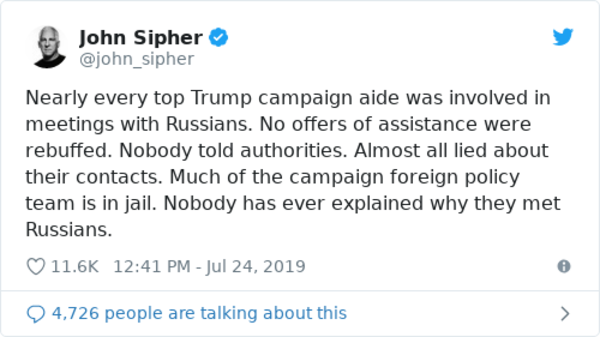 |
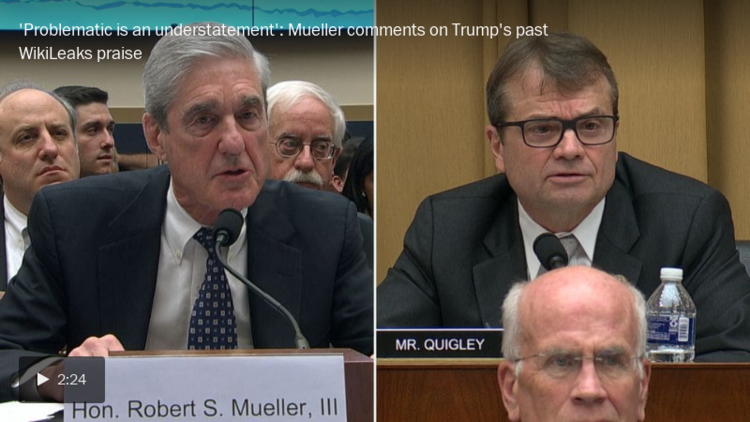 |
| 'Problematic is an understatement': Mueller comments on Trump's past WikiLeaks praise |
Mueller faulted Trump for previously praising the anti-secrecy group, whose leader Julian Assange now faces federal charges, and which allegedly served as a conduit for the Russians to disseminate hacked emails of Hillary Clinton campaign officials.
Mueller said he agrees with Mike Pompeo’s characterization of WikiLeaks as a “hostile intelligence service.” Trump said “I love WikiLeaks” at a rally in the fall of 2016. His son Don Jr. tweeted a link to stolen documents that Mueller’s report said was provided to him by WikiLeaks in a Twitter direct message.
Intelligence Committee Chairman Adam Schiff (D-Calif.) asked Mueller whether knowingly accepting foreign assistance is an unethical thing to do. “And a crime, given certain circumstances,” Mueller replied, nodding. “It’s also unpatriotic,” said Schiff. “True,” replied Mueller.
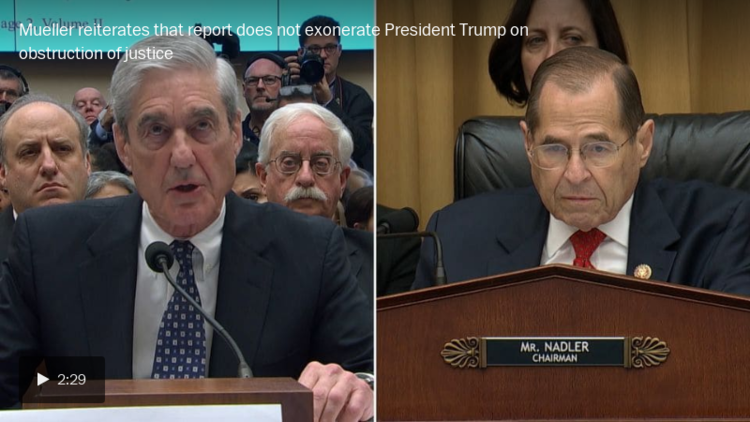 |
| Mueller reiterates that report does not exonerate President Trump on obstruction of justice |
3) Rebutting Trump’s claims of total exoneration: “The president was not exculpated for the acts that he allegedly committed.”
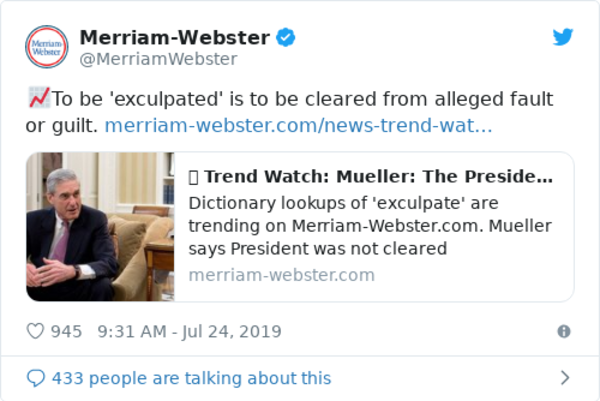 |
“We did not address ‘collusion,’ which is not a legal term,” Mueller said in his opening statement. “Rather, we focused on whether the evidence was sufficient to charge any member of the campaign with taking part in a criminal conspiracy. It was not.”
Asked whether the president, under Justice Department policy, could be prosecuted for obstruction of justice after he leaves office, Mueller kept his answer succinct: “True.”
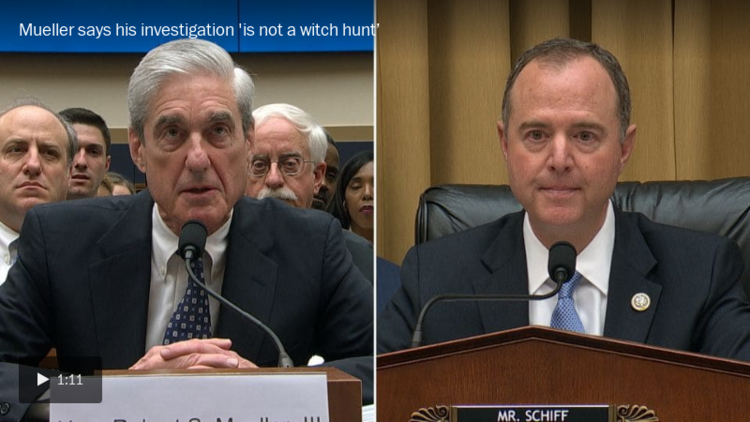 |
| Mueller says his investigation 'is not a witch hunt’ |
4) Finally defending the integrity of his investigation: “It is not a witch hunt.”
For two years, Mueller kept quiet as Trump and his allies impugned him and his team. Even during the news conference in May to announce his resignation as special counsel, Mueller did not offer a full-throated defense of his methods or personnel. On Wednesday, he replied to GOP criticism that some of the career prosecutors on his team previously gave money to Democrats.
“I’ve been in this business for almost 25 years. In those 25 years, I’ve not had occasion once to ask about somebody’s political affiliation,” Mueller said. “It is not done. What I care about is the capability of the individual to do the job and do the job seriously and quickly and with integrity.”
Justice Department policy prohibits asking about political views as part of a job interview. Mueller also explained that he moved former FBI official Peter Strzok off his team as soon as he found out about anti-Trump text messages in 2016.
Rep. Guy Reschenthaler (R-Pa.) accused Mueller of including only “the very worst” information about Trump in his report. “Not true,” he replied, adding that the team “strove to put in exculpatory evidence” about Trump’s conduct.
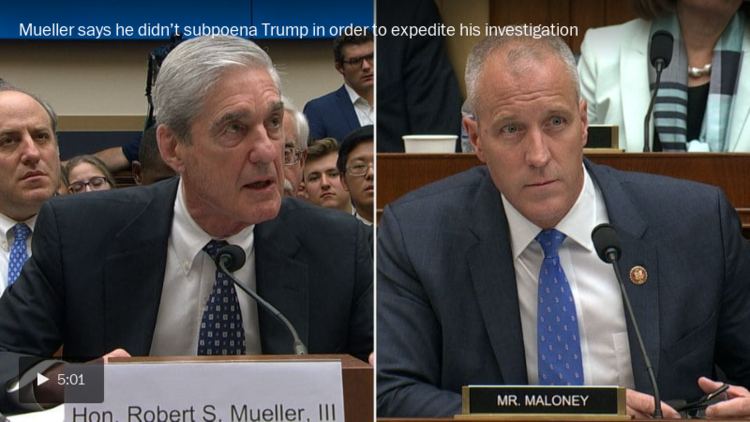 |
| Mueller says he didn’t subpoena Trump in order to expedite his investigation |
5) On why he didn’t subpoena the president: “We decided that we did not want to exercise the subpoena powers because of the necessity of expediting the end of the investigation.”
The former special counsel conceded that Trump’s written answers to his questions about Russian interference — the president refused to answer any questions about the 10 episodes of potential obstruction of justice that his office explored – were “certainly not as useful as the interview would be.”
Despite Trump’s claims that he fully cooperated, Mueller noted that the president’s team stonewalled in negotiations for over a year about a sit-down interview and said he assumed Trump “would fight the subpoena.” Mueller explained that he needed to decide “how much time you are willing to spend in the courts litigating an interview with the president.”
Despite claims that Mueller wanted to drag out his investigation, he made clear that he hoped to get it wrapped up as soon as possible. “The reason we didn’t do the interview was because of the length of time that it would take to resolve the issues attendant to that,” he said.
 |
| Trump says Mueller did ‘horrible job’ |
6) There was a coverup: “A number of people we interviewed in our investigation, it turns out, did lie.”
Michael Flynn, Paul Manafort, Michael Cohen, Rick Gates and George Papadopoulos have each acknowledged that they lied to the FBI. Rep. Val Demings (D-Fla.) asked Mueller whether it was “fair to say” that Trump’s written answers were “not only inadequate and incomplete, because he didn’t answer many of your questions, but where he did, his answers showed that he wasn’t always being truthful.”
“I would say, generally,” Mueller replied.
Mueller acknowledged that he caught many former members of Trump’s team not telling the truth, and this made it harder to investigate what really happened. “That would be accurate,” he said.
“And then,” Schiff said, “they lied to cover it up?”
“Generally, that’s true,” said Mueller.
Trump tweeted as soon as the second hearing ended: “TRUTH IS A FORCE OF NATURE!”
Indeed.

No comments:
Post a Comment